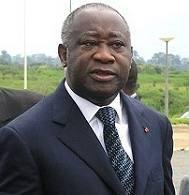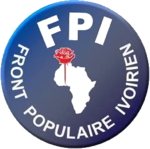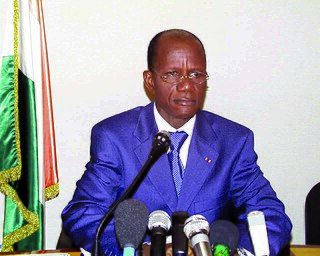Related Research Articles

Koudou Laurent Gbagbo is an Ivorian politician who was the President of Côte d'Ivoire from 2000 until his arrest in April 2011. A historian, Gbagbo was imprisoned in the early 1970s and again in the early 1990s, and he lived in exile in France during much of the 1980s as a result of his union activism. Gbagbo founded the Ivorian Popular Front (FPI) in 1982 and ran unsuccessfully for president against Félix Houphouët-Boigny at the start of multi-party politics in 1990. He won a seat in the National Assembly of Côte d'Ivoire in 1990.

Aimé Henri Konan Bédié is an Ivorian politician. He was President of Côte d'Ivoire from 1993 to 1999. He is currently the President of the Democratic Party of Côte d'Ivoire - African Democratic Rally (PDCI-RDA).

Pascal Affi N'Guessan is an Ivorian politician who is the President of the Ivorian Popular Front (FPI). He was the Prime Minister of Ivory Coast from 27 October 2000 to 10 February 2003.

The First Ivorian Civil War was a conflict in the Ivory Coast that began in 2002. Although most of the fighting ended by late 2004, the country remained split in two, with a rebel-held north and a government-held south. Hostility increased and raids on foreign troops and civilians rose. As of 2006, the region was tense, and many said the UN and the French military failed to calm the civil war.

Alassane Dramane Ouattara is an Ivorian politician who has been President of Ivory Coast since 2010. An economist by profession, Ouattara worked for the International Monetary Fund (IMF) and the Central Bank of West African States, and he was the Prime Minister of Côte d'Ivoire from November 1990 to December 1993, appointed to that post by President Félix Houphouët-Boigny. Ouattara became the President of the Rally of the Republicans (RDR), an Ivorian political party, in 1999.

The Ivorian Popular Front is a centre-left, democratic socialist and social democratic political party in Ivory Coast.

Romain Francis Wodié is an Ivorian politician. A professor and human rights activist, he led the Ivorian Workers' Party (PIT) from 1990 to 2011. During that time, Wodié served as a Deputy in the National Assembly of Côte d'Ivoire from 1990 to 1995 and as Minister of Higher Education from 1998 to 1999. He was President of the Constitutional Council of Côte d'Ivoire from 2011 to 2015.

Guillaume Kigbafori Soro is an Ivorian politician who was the Prime Minister of Côte d'Ivoire from April 2007 to March 2012. Prior to his service as Prime Minister, Soro led the Patriotic Movement of Côte d'Ivoire, and later the New Forces as its Secretary-General. In March 2012, Soro became President of the National Assembly of Côte d'Ivoire. He stepped down from that position in February 2019, announcing in June 2019 that he is running to succeed President Alassane Ouattara.

Charles Blé Goudé is an Ivorian political leader, born at Guibéroua, in the centre west of the country. He is currently on trial at the International Criminal Court for crimes against humanity allegedly committed in Côte d'Ivoire during the presidency of Laurent Gbagbo.

The Alliance des jeunes patriotes pour le sursaut national commonly known as Young Patriots, of Côte d'Ivoire.
Simone Ehivet Gbagbo is an Ivorian politician. She is the President of the Parliamentary Group of the Ivorian Popular Front (FPI) and is a Vice-President of the FPI. As the wife of Laurent Gbagbo, the President of Côte d'Ivoire from 2000 to 2011, she was also First Lady of Ivory Coast prior to their arrest by pro-Ouattara forces.

Presidential elections were held in Ivory Coast in 2010. The first round was held on 31 October, and a second round, in which President Laurent Gbagbo faced opposition leader Alassane Ouattara, was held on 28 November 2010. Originally scheduled to be held in 2005, the vote was delayed several times due to the Ivorian Civil War and difficulties involved in the organization and preparation of the elections. A peace agreement between the government and the former rebel New Forces was signed on 4 March 2007, and in late April 2009, it was announced that the elections would be held by 6 December 2009, and that the date would be announced shortly. On 15 May 2009, the date was announced to be 29 November 2009. On 11 November, the elections were postponed again due to delays in the electoral roll. It was announced on 3 December 2009 to be held in late February or early March 2010.

Parliamentary elections were held in Ivory Coast on 11 December 2011, after the presidential elections in late 2010. They followed a peace agreement between the government and the New Forces that was signed in March 2007. The Rally of the Republicans, the party of President Alassane Ouattara, won just under half the seats in the National Assembly.

Mamadou Koulibaly is an Ivorian politician, Chairman of LIDER, a classical liberal political party he founded in July 2011. Previously, he was President of the National Assembly of Côte d'Ivoire from 2001 to 2011, Minister of the Budget in 2000 and Minister of Economy and Finance from 2000 to 2001. For years he was leading member of the Ivorian Popular Front (FPI), briefly leading the party in an interim capacity in 2011 before quitting it.

Émile Boga Doudou was an Ivorian politician who served as Minister of State for the Interior and Decentralization from 2000 to 2002. He was killed in the failed coup attempt that marked the start of the Ivorian Civil War.

The 1999 Ivorian coup d'état took place on 24 December 1999. It was the first coup d'état since the independence of Ivory Coast and led to the President Henri Konan Bédié being deposed.
Innocent Kobena Anaky is an Ivorian politician and the President of the Movement of the Forces of the Future (MFA), an opposition party. He served in the government of Côte d'Ivoire as Minister of State for Transport from 2003 to 2006.
Aboudramane Sangaré, also spelled Abou Drahamane Sangaré, was an Ivorian politician and co-founder of the Ivorian Popular Front (FPI) political party. He served as Foreign Minister of Ivory Coast from October 2000 to March 2003 under President Laurent Gbagbo, a close political ally. Sangare was president of a dissident, pro-Gbagbo faction of Ivorian Popular Front members at the time of his death in 2018.
This period in the history of Ivory Coast was affected by the end of the 33-year reign of Félix Houphouët-Boigny in 1993, as well as demographic change which had seen the Muslim population rise from 6% in 1922 to 38.6% in 1998, including a majority in the north of the country.

Parliamentary elections were held in Ivory Coast on 6 March 2021. The previous elections, held in 2016, saw the presidential coalition win more than the half the seats in the National Assembly.
References
- ↑ "Laurent Akoun". afdevinfo.com. 18 May 2006. Retrieved 23 April 2011.
- ↑ "Cote d'Ivoire: legal concern: Laurent Akoun and others". Amnesty International. 19 February 1992. Archived from the original on 10 August 2011. Retrieved 23 April 2011.
- ↑ "123rd IPU Assembly" (PDF). ipu.org. October 2010. Retrieved 23 April 2011.
- ↑ "Laurent Akoun (député Fpi) - "Le sort de Mambé est scellé"". fr.allafrica.com (in French). 11 February 2010. Retrieved 23 April 2011.